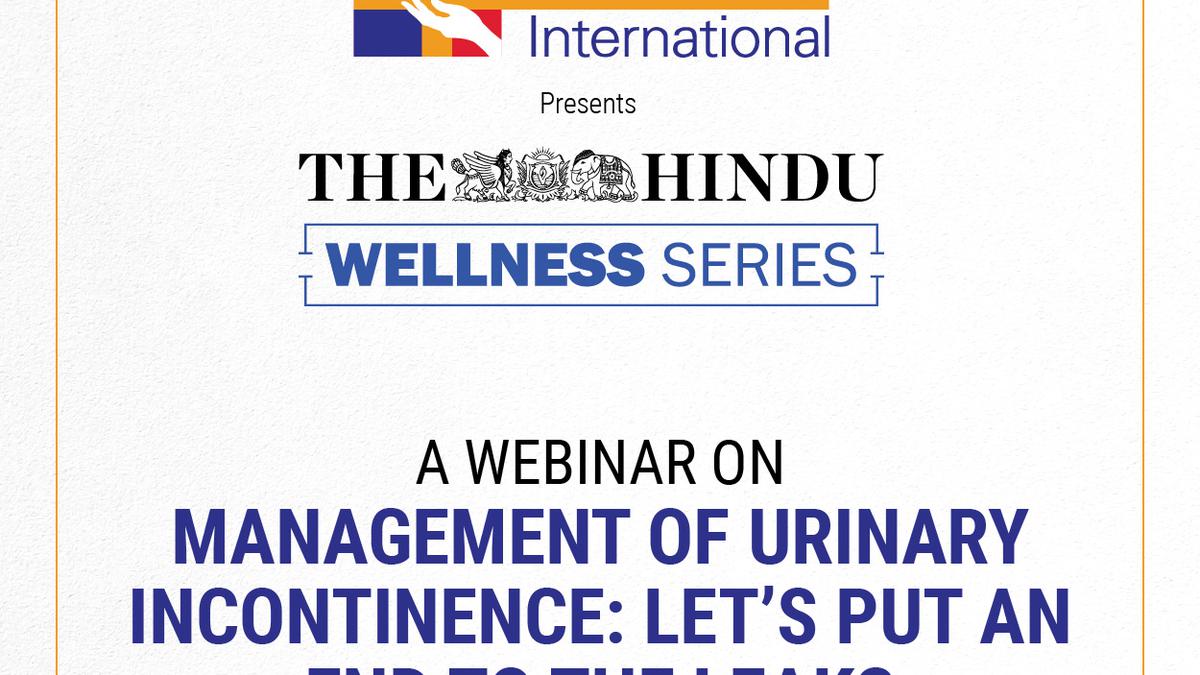
Early intervention is best solution to urinary incontinence, say doctors at webinar
The Hindu
According to urologists, Urinary Incontinence (UI) affects 25% to 45% of women population and 11% to 34% of older men. But people are shy of seeking medical help due to embarrassment and often sink into self-isolation. Whereas, they should get evaluated at the earliest symptoms, R. Manikandan, director, Department of Urology, MIOT Hospital, said during the webinar on ‘Management of Urinary Incontinence: Let’s put an end to the leaks’ on Friday
A webinar on management of urinary incontinence was held as a part of the The Hindu Wellness series.
According to urologists, Urinary Incontinence (UI) affects 25% to 45% of women population and 11% to 34% of older men. But people are shy of seeking medical help due to embarrassment and often sink into self-isolation. Whereas, they should get evaluated at the earliest symptoms, R. Manikandan, director, Department of Urology, MIOT Hospital, said during the webinar on ‘Management of Urinary Incontinence: Let’s put an end to the leaks’ on Friday.
He elaborated on the probable causes of urinary incontinence and treatment options. The earliest symptoms were urine leaks during coughing, sneezing and laughing. It occurs because of weakening of pelvic floor muscles, ageing, family history, obesity, post-trauma of an injury or surgery or stress. In men, prostate enlargement could be a cause while multiple pregnancies, childbirth and menopause made women more vulnerable to urinary incontinence.
He said the four common types of incontinence — stress (when sneezing or coughing increases abdominal pressure), urge (sudden urge to pass urine), overflow (unable to empty bladder fully leads to frequent leakage) and total (when bladder is unable to store urine and there is constant leakage during standing or walking).
Exercises play an important role. Kegel exercises and bladder rehabilitation coupled with simple lifestyle modifications such as restricting fluid intake during evenings and emptying the bladder every four hours, can help to reverse the urinary incontinence, Dr. Manikandan said.
If the issue persists, it can be managed with medicines that help relax the bladder. Surgical interventions come in as the last line of treatment, he said.

“Writing, in general, is a very solitary process,” says Yauvanika Chopra, Associate Director at The New India Foundation (NIF), which, earlier this year, announced the 12th edition of its NIF Book Fellowships for research and scholarship about Indian history after Independence. While authors, in general, are built for it, it can still get very lonely, says Chopra, pointing out that the fellowship’s community support is as valuable as the monetary benefits it offers. “There is a solid community of NIF fellows, trustees, language experts, jury members, all of whom are incredibly competent,” she says. “They really help make authors feel supported from manuscript to publication, so you never feel like you’re struggling through isolation.”

Several principals of government and private schools in Delhi on Tuesday said the Directorate of Education (DoE) circular from a day earlier, directing schools to conduct classes in ‘hybrid’ mode, had caused confusion regarding day-to-day operations as they did not know how many students would return to school from Wednesday and how would teachers instruct in two modes — online and in person — at once. The DoE circular on Monday had also stated that the option to “exercise online mode of education, wherever available, shall vest with the students and their guardians”. Several schoolteachers also expressed confusion regarding the DoE order. A government schoolteacher said he was unsure of how to cope with the resumption of physical classes, given that the order directing government offices to ensure that 50% of the employees work from home is still in place. On Monday, the Commission for Air Quality Management in the National Capital Region and Adjoining Areas (CAQM) had, on the orders of the Supreme Court, directed schools in Delhi-NCR to shift classes to the hybrid mode, following which the DoE had issued the circular. The court had urged the Centre’s pollution watchdog to consider restarting physical classes due to many students missing out on the mid-day meals and lacking the necessary means to attend classes online. The CAQM had, on November 20, asked schools in Delhi-NCR to shift to the online mode of teaching.









